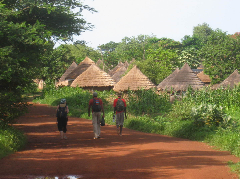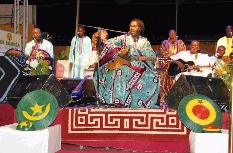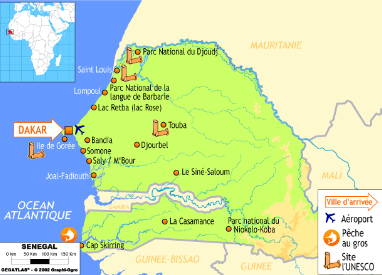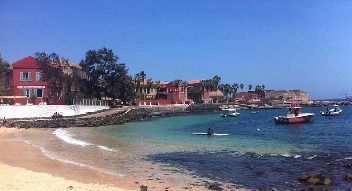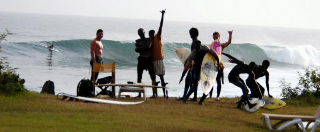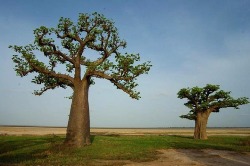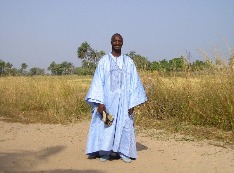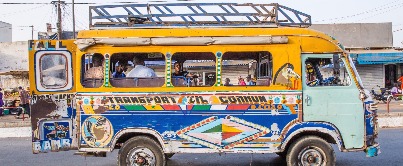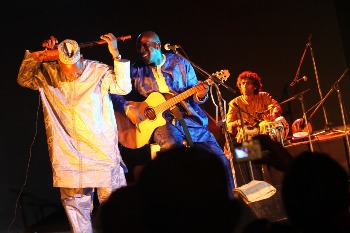Featured Country: Senegal
One of Africa's most stable nations with an incredibly rich musical tradition and heritage, this endearing West African country is worth exploring, in music and as a travel destination
Related Features:
- Focus on Max Adioa, famous Senegalese Reggaeman in the World Reggae page here
- Links on Senegal travel, music and culture in the Links & Services page here
Selection of great music from Senegal in this 6 hours long Spotify playlist...enjoy!
Senegal is a relatively small country in West Africa, with a population of about 14 million for a size of 196,712km2 (76,000 sq mi). It is the westernmost country in the Eurasian - African landmass, facing the Americas across the Atlantic Ocean.
With many tourist attractions from fine beaches, national parks with interesting fauna and flora, a pink coloured salt lake, interesting colonial cities such as St Louis or Ziguinchor, the infamous Gorée Island from where many slaves were transported in inhumane conditions to New World plantations, to its bustling capital Dakar, famous for being the original ending point of the Paris - Dakar rally, former French colony Senegal is an interesting and easy to visit country.
Rich in folklore, arts and handicrafts, Senegal has a vibrant music scene with world famous musicians such as Youssou N'dour, Baba Maal and Ismael Lo among many others, and is associated with the lively mbalax style of music.
Traditional West African instruments such as Jembe drums or the Kora string instrument feature prominently in both traditional and modern music genres, while griots (West African story tellers, poets and musicians) preserve the legacy of oral and musical traditions.
With several ethnic and linguistic groups, of which the Wolof represent the majority, French is the official language. Muslims form the majority of the population at about 95%, many belonging to religious brotherhoods, the most famous of which are the Mourides.
Senegal obtained its independence from France in 1960, with poet, writer and African thinker Leopold Sedar Senghor as its first president, who established a solid democratic legacy, being the first African president to step down voluntarily in a country that has never experienced rule by unelected autocrats. Senegal has a rich history linked to the various African empires that held power in West Africa, the introduction of Islam over centuries of Arabic and Berber influence and the various colonial powers that coveted the territory until the French came to dominate most of it.
Agriculture is the basis of the economy, notably the production of peanuts, with phosphates extraction, fisheries and a seaside, culture and nature based tourism contributing significantly as well to the country's export earnings.
Travel and tourism in Senegal
For wildlife, the Niokolo Koba National Park is a must, while there are several other natural reserves. A visit to Lake Retba near Dakar, a pink coloured lake with a very high salinity, is highly recommended as well, so is a trip along the Casamance river in the south with its many islands.
For cities, culture and history, St Louis in the north is full of old French colonial flavour, Ziguinchor in the south is a laid back town and gateway to the Casamance region, Touba is the spiritual home of the Mouride brotherhood, while Dakar is the country's centre of commerce and culture and its lively capital, with its posh residential areas along the corniche jutting into the Atlantic and its populous Medina with the famous Soumbedioune market and Dakar's Grand Mosque. A short ferry ride away is the atmospheric Gorée Island, with tranquil streets, old colonial buildings and its poignant House of Slaves, a very emotional visit for those whose ancestry can be traced to this particular place.
With a warm tropical climate year round and miles of often deserted beaches, sun seekers and beach lovers will not be disappointed, whether in resorts around Dakar or in Casamance, with Cap Skirring as its most famous beach area.
There are also many good yet little known surfing spots, especially around Dakar, where a burgeoning surfer scene is developing.
When hungry, Senegal has one of the most varied cuisines in Africa, due to the many foreign influences from North Africa and Europe that have mixed with what was locally available, particularly fish with Tieboudienne (literally 'rice of fish') considered the national dish alongside the lip smacking onion and lemon flavoured Yassa chicken.
Worth a try when visiting the salt water bolongs (channels mostly in the Sine Saloum and Casamance river estuaries) of the south (great places for bird watching too) are the mangrove oysters, cooked on the branch on an open fire, eaten with a pinch of lemon...simply delicious!
If shopping is more your thing, markets in Senegal are well stocked with handicrafts, particularly wood carvings and textiles, while there is a thriving art scene exhibiting and for sale in the many art galleries, as well as several well-known fashion designers with creations drawing from tradition or giving an elegant twist to the flowing and comfortable Senegalese boubou.
Music instruments such as Jembe, Balafon, DunDun drums or Kora are of course a good buy too...great for joining drum circles or start a new musical vocation!
Safe, stable, tolerant, diverse, culture and music rich, with a flurry of interesting natural and cultural attractions, a vibrant nightlife, sunny seaside resorts, great food and shopping, interesting festivals and a friendly and hospitable population reflected in the spirit of 'teranga' (hospitality in the Wolof language, but also a way of life in Senegal), the West African nation of Senegal has much to offer to travellers, with a mature tourism industry that is still low in volumes, especially from non-French speaking countries.
With several festivals such as the well-established St Louis International Jazz Festival, considered one of the best in Africa; Baaba Maal's own Blues du Fleuve festival and the cultural Abene village festival in Casamance, there are plenty of reasons to follow your ears to this charming country, visit its attractions, try its food and most of all, enjoy its rich and varied musical heritage!
Getting there is quite easy, with regular flights from places such as Paris, Brussels, Madrid, Milan or Istanbul from Europe, Dubai, Johannesburg, Washington or New York, as well as many other African airports...or if you want to do it the hard way, you can ride or drive across the Sahara and follow the routes used in former Paris - Dakar races. Getting around is usually by public buses of various sizes and comfort levels or by 'taxi-brousse' (bush taxis), with a ferry joining Dakar to Ziguinchor in the south if you want to avoid crossing the country by road and going through The Gambia, the English speaking sliver of a country enclaved in Senegal.
Several, generally specialized, tour operators offer escorted group or individual trips to Senegal, for general touring or for special interests, while there are many possibilities for volontourism or to volunteer with the many agencies carrying development assistance in the country.
Hoping that Senegal is now on your travel plans, please check the other music sections above for more on its sounds and rhythms. Go to the Links & Services page for plenty of useful links to know more about the country and prepare your trip...and most of all, enjoy the destination and music videos from the playlists below and in the other sections. Time to Travel With Your Ears™!
Senegal Destination Videos
A travel inspiring introduction to Senegal in sounds and images
Images of Dakar, Senegal's capital city
Aerial images of the Casamance region in Southern Senegal
Surfing images and cool waves near Dakar, as featured in the Endless Summer, another reason to visit...
Music Videos from Senegal
Serin Fallu by Youssou N'dour, one of Senegal's most internationally known stars
Traditional Jembe drummers (Senegal)...9 minutes of expert drumming!
Fouta Toro by Arc-en-ciel from Senegal, a duo from the Fulani people, the largest nomadic group on Earth
Serigne Modou Moustapha by Fatou Guewel, one of Senegal's most powerful female voices
Njilou by Baaba Maal, one of Senegal's top stars and most powerful voices, in an homage to Nelson Mandela
Fouta by Aby Ndour, an emotional song with beautiful images and another of Senegal's great voices





















